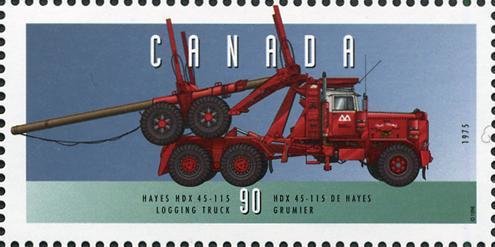Stamp: Hayes HDX 45-115, 1975, Logging Truck (Canada 1996)
Hayes HDX 45-115, 1975, Logging Truck (Canada 1996)
08 June (Canada ) within release Historic Industrial & Commercial Vehicles - 4 goes into circulation Stamp Hayes HDX 45-115, 1975, Logging Truck face value 90 Canadian cent
| Stamp Hayes HDX 45-115, 1975, Logging Truck in catalogues | |
|---|---|
| Michel: | Mi:CA 1570 |
| Stamp Number: | Sn:CA 1604f |
Stamp is horizontal format.
Also in the issue Historic Industrial & Commercial Vehicles - 4:
- Souvenir Sheet - Historic Industrial & Commercial Vehicles face value 3.74;
- Stamp - Still Motor Co. Ltd., 1899, Electric Van face value 45;
- Stamp - Waterous Engine Works Road Roller (1914) face value 45;
- Stamp - International D-35, 1938, Delivery Truck face value 52;
- Stamp - Champion Road Grader, 1936 face value 52;
- Stamp - White Model WA 122, 1947, Tractor-Trailer face value 90;
- Stamp - Hayes HDX 45-115, 1975, Logging Truck face value 90;
Stamp Hayes HDX 45-115, 1975, Logging Truck it reflects the thematic directions:
A vehicle (from Latin: vehiculum) is a mobile machine that transports people or cargo. Typical vehicles include wagons, bicycles, motor vehicles (motorcycles, trucks, buses), railed vehicles (trains, trams), watercraft (ships, boats), aircraft and spacecraft. Land vehicles are classified broadly by what is used to apply steering and drive forces against the ground: wheeled, tracked, railed or skied. ISO 3833-1977 is the standard, also internationally used in legislation, for road vehicles types, terms and definitions.
A truck or lorry is a motor vehicle designed to transport freight, carry specialized payloads, or perform other utilitarian work. Trucks vary greatly in size, power, and configuration, but the vast majority feature body-on-frame construction, with a cabin that is independent of the payload portion of the vehicle. Smaller varieties may be mechanically similar to some automobiles. Commercial trucks can be very large and powerful and may be configured to be mounted with specialized equipment, such as in the case of refuse trucks, fire trucks, concrete mixers, and suction excavators. In American English, a commercial vehicle without a trailer or other articulation is formally a "straight truck" while one designed specifically to pull a trailer is not a truck but a "tractor"
Transport or transportation is the movement of people, animals and goods from one location to another. Modes of transport include air, rail, road, water, cable, pipeline and space. The field can be divided into infrastructure, vehicles and operations. Transport is important because it enables trade between people, which is essential for the development of civilizations.



